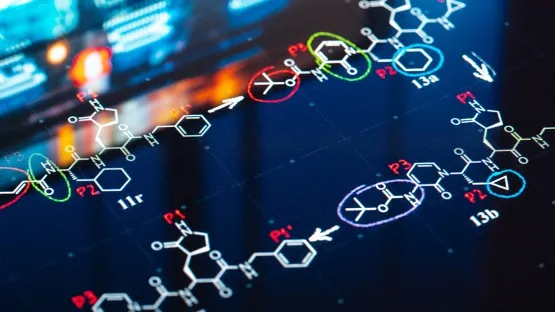
Revolutionary AI and Quantum Computing Collaboration Unveils Peptides to Combat Microplastic Pollution!
2025-01-21
Author: Mei
Introduction
A groundbreaking research initiative from Cornell University has unveiled an innovative method that combines artificial intelligence (AI) with quantum computing to create peptides that can effectively capture and break down microplastics, a growing threat to both environmental ecosystems and human health.
Understanding Microplastics
Microplastics – tiny plastic particles resulting from the breakdown of larger plastic debris – have become a significant pollutant in oceans and waterways. These particles not only harm marine life but can also enter the human food chain, leading to potential health risks. The newly developed peptides, which are short chains of amino acids that can be tailored for specific functions, show promise in binding to microplastics and enabling chemical reactions that could degrade them.
The Breakthrough Study
Despite the potential, the design of such peptides for many types of plastics has been hindered by a lack of comprehensive data on how peptides interact with these materials. The breakthrough study, published on December 18 in the prestigious journal Science Advances, describes a novel approach that melds generative AI models—used to predict the properties of peptides—with sophisticated quantum computing techniques aimed at optimizing these designs for particular types of plastics.
Unique Approach and Findings
Lead researcher Fengqi You, a prominent figure in Energy Systems Engineering at Cornell, emphasized the uniqueness of this approach, stating, “Scientists don’t have the extensive datasets required for creating peptides aimed at microplastics, unlike those available for medical applications. That’s where quantum computing acts as a game-changer.” The hybrid quantum-classical framework successfully created peptides with impressive binding properties specifically for polyethylene terephthalate (PET), a common plastic known for its environmental persistence. Remarkably, these peptides also exhibited favorable water solubility, allowing them to integrate seamlessly into potential water treatment applications.
Validation and Applications
The team validated their findings through molecular dynamics simulations, revealing practical applications for these peptides in developing microplastic biosensors and engineered microbes designed to consume plastics. This pioneering research arrives at a pivotal moment, where AI's transformative capabilities are being acknowledged across various fields, especially medicine and biological sciences.
Future Directions
Additionally, You, who serves as co-director of the Cornell University AI for Science Institute, noted that the flexibility of the hybrid computing framework allows it to adapt to advancements in quantum technology as it progresses. This research was not an isolated effort; it was conducted in partnership with Carol K. Hall, a respected professor from North Carolina State University, along with a talented team of co-first authors, including visiting ETH Zurich graduate student Raul Conchello Vendrell, postdoctoral researcher Akshay Ajagekar, and doctoral candidate Michael T. Bergman.
In a complementary study published on January 21 in PNAS Nexus, the researchers also explored the application of their methods to design peptides suited to other prevalent plastics, such as polyethylene and polypropylene. This research focused on optimizing amino acid sequences for strong binding capabilities while also adapting to varying environmental conditions.
Conclusion
Future endeavors for the research team will involve the synthesis and testing of these promising peptides in both laboratory and natural settings. They also aim to refine their computational techniques to tackle other pressing sustainability challenges, potentially opening new avenues for combatting plastic pollution on a larger scale.
Support and Acknowledgments
This research has received significant backing from the National Science Foundation and the Eric and Wendy Schmidt AI in Science Postdoctoral Fellowship, highlighting the increasing intersection between technology and environmental stewardship.
Stay Informed
Stay tuned for more updates as this innovative research unfolds and may play a key role in reshaping our approach to microplastic pollution!


 Brasil (PT)
Brasil (PT)
 Canada (EN)
Canada (EN)
 Chile (ES)
Chile (ES)
 Česko (CS)
Česko (CS)
 대한민국 (KO)
대한민국 (KO)
 España (ES)
España (ES)
 France (FR)
France (FR)
 Hong Kong (EN)
Hong Kong (EN)
 Italia (IT)
Italia (IT)
 日本 (JA)
日本 (JA)
 Magyarország (HU)
Magyarország (HU)
 Norge (NO)
Norge (NO)
 Polska (PL)
Polska (PL)
 Schweiz (DE)
Schweiz (DE)
 Singapore (EN)
Singapore (EN)
 Sverige (SV)
Sverige (SV)
 Suomi (FI)
Suomi (FI)
 Türkiye (TR)
Türkiye (TR)
 الإمارات العربية المتحدة (AR)
الإمارات العربية المتحدة (AR)